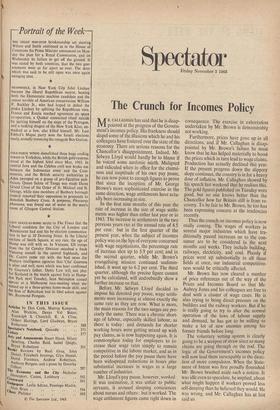The Crunch for Incomes Policy
MR. CALLAGHAN has said that he is disap- pointed at the progress of the Govern- ment's incomes policy. His frankness should dispel some of the illusions which he and his colleagues have fostered over the state of the economy. There are serious reasons for the Chancellor's disappointment. Indeed, Mr. Selwyn Lloyd would hardly be to blame if he voiced some sardonic mirth. Maligned and ridiculed when in office for the clumsi- ness and ineptitude of his own pay pause, he can now point to enough figures to prove that since the inception of Mr. George Brown's more sophisticated exercise in the same direction, wage settlements have actu- ally been increasing in size. MR. CALLAGHAN has said that he is disap- pointed at the progress of the Govern- ment's incomes policy. His frankness should dispel some of the illusions which he and his colleagues have fostered over the state of the economy. There are serious reasons for the Chancellor's disappointment. Indeed, Mr. Selwyn Lloyd would hardly be to blame if he voiced some sardonic mirth. Maligned and ridiculed when in office for the clumsi- ness and ineptitude of his own pay pause, he can now point to enough figures to prove that since the inception of Mr. George Brown's more sophisticated exercise in the same direction, wage settlements have actu- ally been increasing in size.
In the first nine months of this year the rate of increase in the size of wage settle- ments was higher than either last year or in 1963. The increase in settlements in the two previous years ran at the annual rate of 4.5 per cent : but in the first quarter of the present year, when the subject of incomes policy was on the lips of everyone concerned with wage negotiations, the percentage rate of increase shot up to 5.9 per cent; and in the second quarter, while Mr. Brown's evangelising mission continued undimin- ished, it went up to 6.2 per cent. The third quarter, although the precise figure cannot yet be calculated, will undoubtedly show a further increase on that.
Before Mr. Selwyn Lloyd decided to impose his detested pay pause, wage settle- ments were increasing at almost exactly the same rate as they are now. What is more, the main reasons for the two surges are pre- cisely the same. There was a chronic short- age of labour, especially skilled labour, as there is today : and demands for shorter working hours were getting mixed up with pay claims, as is now happening again. It is commonplace today for employers to in- crease their wage rates simply to remain competitive in the labour market, and as in the period before the pay pause them have been widespread reductions in hours plus substantial increases in wages in a large number of industries.
Mr. Lloyd's pay pause, however, worked. It was insensitive, it was unfair to public servants, it aroused sleeping consciences about nurses and others : but it worked. The wage settlement figures came right down in
consequence. The exercise in exhortation undertaken by Mr. .Brown is demonstrably, not working.
Furthermore, prices have gone up in all directions, and if Mr. Callaghan is disap- pointed by Mr. Brown's failure he must know that he has helped materially to boost the prices which in turn lead to wage claims. Production has actually declined this year. If the present progress down the slippery slope continues, the country is in for a heavy dose of inflation. Mr. Callaghan showed by his speech last weekend that he realises this. The gold figures published on Tuesday were good, but no one knows better than the Chancellor how far Britain still is from re- covery. To be fair to Mr. Brown, he too has been expressing concern at the tendencies recently.
Thus the crunch on incomes policy is now really coming. The wages of workers in several major industries which have tra- ditionally passed increases on to the con- sumer are to be considered in the next Months and weeks. They include building, railways, electricity, and coal. Plainly if prices went up substantially in all these fields at once, our industrial competitive- ness would be critically affected.
Mr. Brown has 'now cleared a number of price references out of the way of the Prices and Incomes Board so that Mr. Aubrey Jones and his colleagues are free to deal with a cluster of wage cases. He is also trying to bring direct pressure on the builders and the railway workers. But if he is really going to try to alter the normal operation of the laws of labour supply and demand, he has got to be willing to make a lot of new enemies among his former friends before long. The voluntary vetting system is clearly going to be a weapon of straw since so many claims are going through on the nod. The logic of the Government's incomes policy will now lead them inescapably in the direc- tion of more compulsion. When the State- ment of Intent was first proudly flourished Mr. Brown brushed aside such a notion. It was idle even to speculate, he implied, about what might happen if workers proved less self-denying than he believed they would. He was wrong, and Mr. Callaghan has at last said so.






































 Previous page
Previous page